The non-availability of genuine planting material of improved varieties, especially in plantation crops is considered as a major bottleneck in improving productivity. Very often, private nurseries take advantage of such a situation and they sell spurious planting materials without any quality assurance through proper labeling.
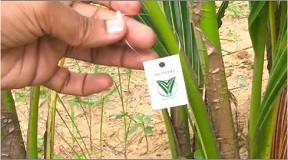
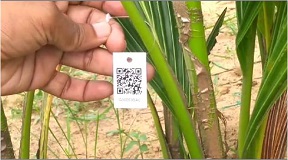
Considering the importance and need to provide quality planting materials, especially, in the perennial horticultural crops, the Government of India is implementing the programme of accreditation of nurseries through the National Horticulture Mission. However, there is no mechanism for ensuring the genuineness and quality of planting materials supplied even from such accredited nurseries. Many farmers suffer huge financial losses due to the purchase of low quality planting material sold by the private nurseries. The importance of Quick Response (QR) Coded planting materials helps in overcoming such drawbacks.
The QR Codes are one of the easiest ways of providing the information to the customers and other individuals, allowing them to extract the valuable data with just scanning the code with the help of an optical reader. In order to ensure the security or to avoid fraudulent labeling, the password protected QR Code allows sharing the relevant information with only authorized people.
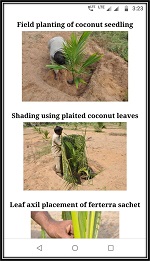
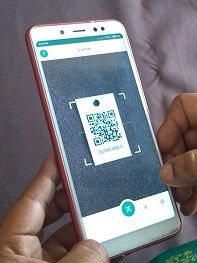
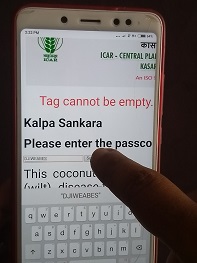
The ICAR-Central Plantation Crops Research Institute, Kasaragod has been distributing the QR coded coconut seedlings for the past three years. The labels having a size of 4.0cm x 2.5 cm with an emblem of ICAR-CPCRI are waterproof laminated. The variety’s name is imprinted on one side and the QR code imprinted on the other side. The label has a Unique Identification Number (UID).
How to use the QR code?
Step - 1: Open the QR Code Scanner App in your Phone.
Step - 2: Hold the phone steadily for 2-3 seconds towards the QR Code you want to scan.
Step - 3: Once the code is scanned, you will be directed to open a link, which will reach to the ICAR-CPCRI website. In the website, you will be prompted to enter the pass code.
Step - 4: Enter the pass code.
After entering the pass code (the unique alphanumerical code imprinted on the reverse side of the label), the App will display the uniqueness and genuineness of the seedling as “The unique identity number you have entered is authentic”. The coconut seedling you have verified is (respective name of the variety). This is the first authentication attempt.
Along with this, the App will also display the details of the variety and cultivation practices to be adopted.
For the second time, the information on the first authentication attempt will not be displayed indicating that the particular label has been already scanned previously.
This QR Code affixed labels can be used for the purpose of tagging/labeling the planting material (grafts/ budded / tissue cultured / vegetatively produced) in the perennial crops like plantation crops, fruit crops and commercial crops. This is an example of successful implementation of QR code labeling technique in coconut, which can be duplicated in other crops as well. If a large number of QR Coded labels are prepared, the cost per code will be between Rs. 4.00 to Rs. 4.50 only.
Considering the hefty cost of planting material of fruit / plantation crops which ranges anywhere between Rs. 200 to Rs 400, this cost to ensure quality will serve for authenticating the material wherein the distribution of spurious seedlings can be identified by the clients.
(Source: ICAR-CPCRI, Regional Station, Kayamkulam and ICAR-CPCRI, Kasaragod, Kerala)








Like on Facebook
Subscribe on Youtube
Follow on X X
Like on instagram